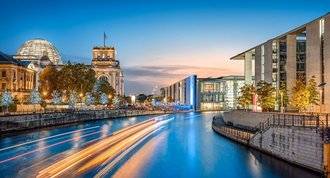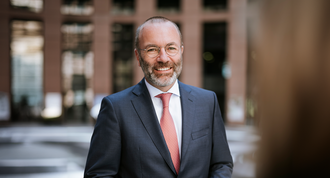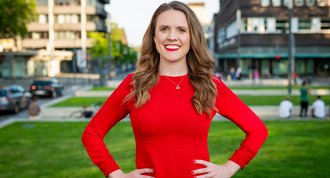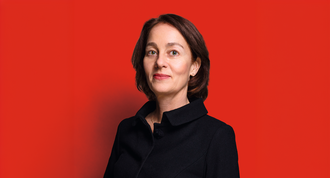
Germany has voted and the first exploratory talks are underway. The next government will have to make important decisions that will affect trade and tourism - and therefore our business. What will it take to make the sectors fit for the future? We asked the Management Board of REWE Group.
 "The country is facing major challenges - which we can only solve together, through dialogue!
"The country is facing major challenges - which we can only solve together, through dialogue!
The new government must tackle a number of issues: Firstly, it must finally strengthen Germany's position as the third largest economy in the world again. To do this, it must support our companies and SMEs in particular, make work more attractive and comprehensively reduce regulation and bureaucracy!
Secondly, the new government must take the concerns and problems of citizens seriously and solve them: Childcare and the school system, health and care as well as security must be at the top of the political agenda. This is the only way Germany can prevent its society from orientating itself towards political extremes out of frustration and protest. Let's set an example together - for democracy and discourse."
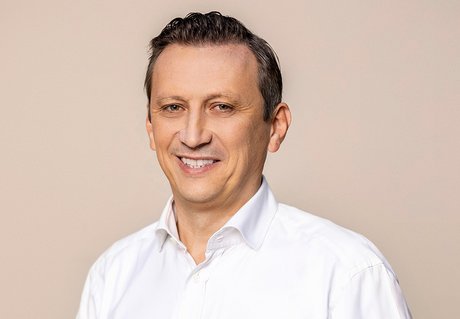 Lionel Souque
Lionel Souque
Chief Executive Officer
(Chief Executive Officer)
 "Diversity is not a nice-to-have, but an essential value for our society. At a time when social diversity is increasingly being discussed, we should realise that diversity goes far beyond economic factors. The central question is: What kind of society do we want to live in? What values do we want to represent and promote? It is clear to me that diversity must be at the top of the list. After all, what is freedom if not the opportunity to be yourself, regardless of origin, gender, age or faith?
"Diversity is not a nice-to-have, but an essential value for our society. At a time when social diversity is increasingly being discussed, we should realise that diversity goes far beyond economic factors. The central question is: What kind of society do we want to live in? What values do we want to represent and promote? It is clear to me that diversity must be at the top of the list. After all, what is freedom if not the opportunity to be yourself, regardless of origin, gender, age or faith?
A diverse society is more open, creative and adaptable. Different perspectives enrich co-operation. New ideas only emerge when very different people can exchange ideas free of prejudice and feel safe. That's why I also believe in diverse teams - we can only find the best and most innovative solutions if different perspectives, opinions and ideas are brought in."
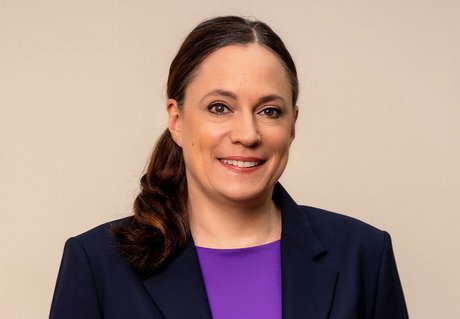 Dr Daniela Büchel
Dr Daniela Büchel
Member of the Management Board - Human Resources and Sustainability (Chief People and Sustainability Officer)
 "One of the most pressing issues for the next government is how we can secure Germany's competitiveness. Digitalisation plays a key role in this. Forecasts predict global revenue of over 15 trillion euros in future markets by 2030, six trillion of which will come from digitalisation and AI alone. We must seize this opportunity! Germany urgently needs an innovation boost, which must come from politics. Specifically, political regulation must guarantee security, but also promote innovation, e.g. through faster authorisation procedures and unbureaucratic laws. Authorities need to become digitally fit, with more specialised staff to provide companies with expert advice on new technologies. We also need a more solution-oriented approach to the skills shortage - flexibility in IT projects and simplified collaboration with external experts are crucial. In order to keep up with global competition, we need to set a clear political course. The race for future markets is wide open, and Germany can score points with innovation and expertise. We are hoping for a new government that will back us up and make Germany fit for the future."
"One of the most pressing issues for the next government is how we can secure Germany's competitiveness. Digitalisation plays a key role in this. Forecasts predict global revenue of over 15 trillion euros in future markets by 2030, six trillion of which will come from digitalisation and AI alone. We must seize this opportunity! Germany urgently needs an innovation boost, which must come from politics. Specifically, political regulation must guarantee security, but also promote innovation, e.g. through faster authorisation procedures and unbureaucratic laws. Authorities need to become digitally fit, with more specialised staff to provide companies with expert advice on new technologies. We also need a more solution-oriented approach to the skills shortage - flexibility in IT projects and simplified collaboration with external experts are crucial. In order to keep up with global competition, we need to set a clear political course. The race for future markets is wide open, and Germany can score points with innovation and expertise. We are hoping for a new government that will back us up and make Germany fit for the future."
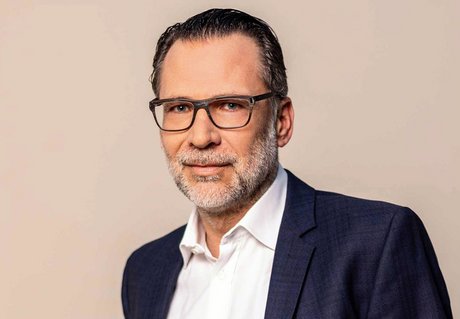 Christoph Eltze
Christoph Eltze
Member of the Management Board - Digital and Technology
(Chief Digital and Technology Officer)
 "The next government must set a decisive course, not only for Germany, but also for its role in a strong Europe. A robust European single market, secure international supply chains and reliable trade partnerships are at the heart of the German economy. However, we also face considerable challenges at home: As retailers, we - but also the entire value chain - are exposed to an ever-increasing number of regulations. I see an urgent need for action here to simplify and streamline legislation. Less is more! This also applies in particular to agriculture, an area that has been (too) little discussed in the current election campaign. Sustainability in agriculture can only be achieved if the additional work involved in agricultural practice is made comprehensible and translated into economic benefits for producers. We need clear political decisions that support farmers and provide a long-term, solid framework."
"The next government must set a decisive course, not only for Germany, but also for its role in a strong Europe. A robust European single market, secure international supply chains and reliable trade partnerships are at the heart of the German economy. However, we also face considerable challenges at home: As retailers, we - but also the entire value chain - are exposed to an ever-increasing number of regulations. I see an urgent need for action here to simplify and streamline legislation. Less is more! This also applies in particular to agriculture, an area that has been (too) little discussed in the current election campaign. Sustainability in agriculture can only be achieved if the additional work involved in agricultural practice is made comprehensible and translated into economic benefits for producers. We need clear political decisions that support farmers and provide a long-term, solid framework."
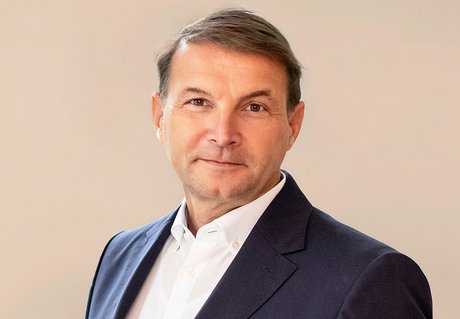 Hans-Jürgen Moog
Hans-Jürgen Moog
Member of the Management Board - Goods and Purchasing
(Chief Procurement Officer)
 "The Bundestag elections on 23 February were a decisive day for Germany. This election not only offers the opportunity to actively shape our future, but also a clear commitment to the values that unite our country and Europe: Democracy, co-operation and diversity. In a globalised world, internationality and intercultural cooperation are indispensable. Europe is facing major challenges that can only be solved together - be it in terms of economic stability or social justice. Strong European cooperation is essential to defend our values and ensure a sustainable future. Germany stands for openness, progress and international cooperation - the next government should stand up for this."
"The Bundestag elections on 23 February were a decisive day for Germany. This election not only offers the opportunity to actively shape our future, but also a clear commitment to the values that unite our country and Europe: Democracy, co-operation and diversity. In a globalised world, internationality and intercultural cooperation are indispensable. Europe is facing major challenges that can only be solved together - be it in terms of economic stability or social justice. Strong European cooperation is essential to defend our values and ensure a sustainable future. Germany stands for openness, progress and international cooperation - the next government should stand up for this."
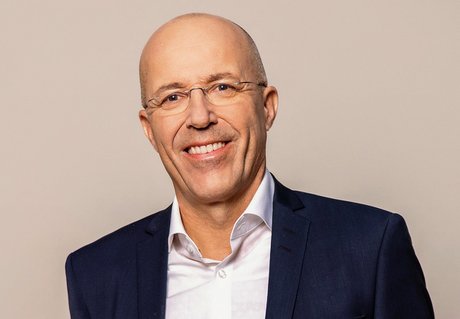 Jan Kunath
Jan Kunath
Deputy Chief Executive Officer
(Deputy Chief Executive Officer)
 "Germany needs to be run more like a company: This demand is very loud at the moment. And I agree, at least in part. Because we are in a crisis - including a psychological one - which entrepreneurs know can be overcome primarily through growth. Only a growing economy enables economic prosperity, social participation and the sustainability of the state and society. As companies, we need stability and predictability, less bureaucracy and streamlined approval procedures, strategies for securing and training skilled labour, including investment in education and training, as well as clear guidelines and incentives for sustainable business practices. This also requires a sensible migration policy as well as falling energy costs and tax burdens. Performance must be more worthwhile again. We heard (too) little about climate protection during the election campaign - but the issue remains important and is an integral part of our corporate strategy at REWE Group. You could also say that we need to think in a more grandchild-friendly way across generations - as a cooperative, we have always done this. What I would also like to see is more calm, more objectivity and less agitation and malice in the necessary debate. The necessary reforms will demand a lot from us as a society, but they will cost us significantly less in the long term than "business as usual" - and we can only achieve this together."
"Germany needs to be run more like a company: This demand is very loud at the moment. And I agree, at least in part. Because we are in a crisis - including a psychological one - which entrepreneurs know can be overcome primarily through growth. Only a growing economy enables economic prosperity, social participation and the sustainability of the state and society. As companies, we need stability and predictability, less bureaucracy and streamlined approval procedures, strategies for securing and training skilled labour, including investment in education and training, as well as clear guidelines and incentives for sustainable business practices. This also requires a sensible migration policy as well as falling energy costs and tax burdens. Performance must be more worthwhile again. We heard (too) little about climate protection during the election campaign - but the issue remains important and is an integral part of our corporate strategy at REWE Group. You could also say that we need to think in a more grandchild-friendly way across generations - as a cooperative, we have always done this. What I would also like to see is more calm, more objectivity and less agitation and malice in the necessary debate. The necessary reforms will demand a lot from us as a society, but they will cost us significantly less in the long term than "business as usual" - and we can only achieve this together."
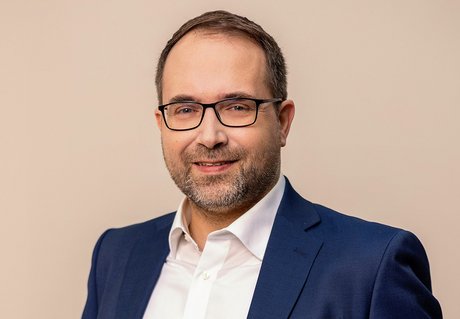 Telerik Shishmanov
Telerik Shishmanov
Member of the Management Board - Finance
(Chief Financial Officer)
 "The challenges facing our country are huge. As an export nation, we are seeing a decline in global demand for our once celebrated products. Our infrastructure - both roads and railways - is in urgent need of modernisation. Although there is a lot of talk about digitalisation, no real progress is being made. And demographic change presents us with additional challenges. Less bureaucracy, less regulation - instead more speed and optimism about the future: that's what I want from the next government. It goes without saying that such topics are the subject of controversial debate.
"The challenges facing our country are huge. As an export nation, we are seeing a decline in global demand for our once celebrated products. Our infrastructure - both roads and railways - is in urgent need of modernisation. Although there is a lot of talk about digitalisation, no real progress is being made. And demographic change presents us with additional challenges. Less bureaucracy, less regulation - instead more speed and optimism about the future: that's what I want from the next government. It goes without saying that such topics are the subject of controversial debate.
What shocks me, however, is the speed with which some people - and even large companies - are turning away from fundamental values that I take for granted: Honesty in our dealings with one another, openness and tolerance - regardless of origin or lifestyle - and solidarity. There is no question that many things will have to change in the future. This will bring upheavals, changes and debates. But one thing is clear to me: our humanity must not be lost in the process. Let's focus on our strengths again: Diversity, innovation and community. These are the qualities that make us successful as a society - and also us at REWE."
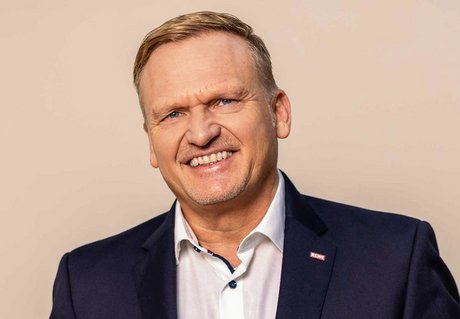 Peter Maly
Peter Maly
Member of the Management Board - REWE (Chief Operating Officer), Logistics and Supply Chain Management

